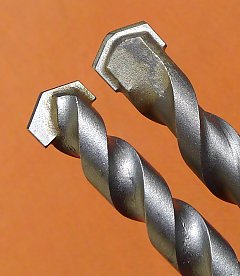Percussion Drill Bits
A percussion drill bit is somewhere in between a universal drill bit and a hammer drill bit and is used in FassadenGrün's product line with the purpose of producing perfect dowel/rawl plug holes using a percussion drill. Percussion drills usually have a round shank; they can transfer the vibrations generated by the drilling machine into hard materials, so that drilling in concrete, clinker-brick, and medium-hard natural stone is possible. They can also be used as a normal rotating drill, without percussion... then usually for normal, plastered masonry. Please also refer to the tips on drilling as needed.
>>> Price list
Why buy new drill bits?
Percussion drill bits are 'two edged' and always work with a front-soldered, double-edged carbide insert, formerly called "WiDia" (in German, "hard like diamond"). Every handyman has such bits, so why buy a new one?
For holders/mounts of facade greenery, perfect drill holes are required (except when applied with a bonding mortar). For this reason we recommend new, sharp drill bits! The holes should not be oval but perfectly round, so that the expansion pressure of the plug is evenly distributed in all directions. Furthermore, the holes should be neither too large nor too small. Unsharp drills often produce larger holes due to missing the centre; worn drill bits also produce rawl plug holes that are too narrow. In both cases, there are problems when you mount the holder: Either the rawl plugs find no hold in the drilled hole and 'spin,' or they sit too tightly and the holders and can be barely screwed in.
Our suggestion: Buy new suitable bits for your climbing aids!
Regrinding of Percussion Drills
The two carbide cutting edges of percussion drills can be re-sharpened by hand, and optimally, on special grinding wheels. A little bit is ground away at the level of the carbide plate. However, this only makes sense with rawl plug (dowel) holes if the width of the carbide plate has not yet worn out significantly below the drill size (see photo).
Concrete Drill Bits, Stone Drill Bits, and Masonry Drill Bits
'Hammer,' 'percussive,' or 'impact' drilling means only that the drill bits are suitable for percussive drilling, i.e. that they tolerate the activation of the percussion/hammering function. According to the suitability for different wall types, they are subdivided again: concrete drill bits are extremely resistant, high-quality, and usable in all types of stone, while masonry drill bits are usually less expensive, less resilient, and used in softer material. Their carbide plate is thinner and not so massively supported in the drill shank (see photos). There are even special masonry drill bits for bricks and roof tiles which can not tolerate 'impact/percussion' and are therefore not percussion drill bits. 'Masonry drill' again is a very general term for longer drills, e.g. for cable glands (bushing/connectors).
Percussion Drill Bits from FassadenGrün
FassadenGrün offers a "hobby"-quality line of percussion drill-bits: with these stone drill bits, you can also refill your existing drill cassettes or fill gaps where bits are missing. For higher demands, we offer a "professional" cassette, in which the concrete drill bits drill into the hardest surfaces with a correspondingly powerful machine (750 watts). A 16 mm masonry drill bit for insulation completes the product line. With each climbing aid kit and also for each individual wall bracket, you will find the necessary drill diameter for mounting.
Limits of Use
Percussion (Hammer/Impact) drill bits reach their limits with materials such as reinforced concrete, hard-fired (historical) clinker bricks with inclusions and sintering points, and very hard natural stone such as granite. It may be necessary to pre-drill with a smaller diameter, or a machine with more power may need to be used. Otherwise, hammer drills and consequently ''hammer drill bits'' with SDS-Plus shank are required. A percussion/impact drill is unsuitable for special facades (wood/plastic/etc..) A universal drill should be used here.




